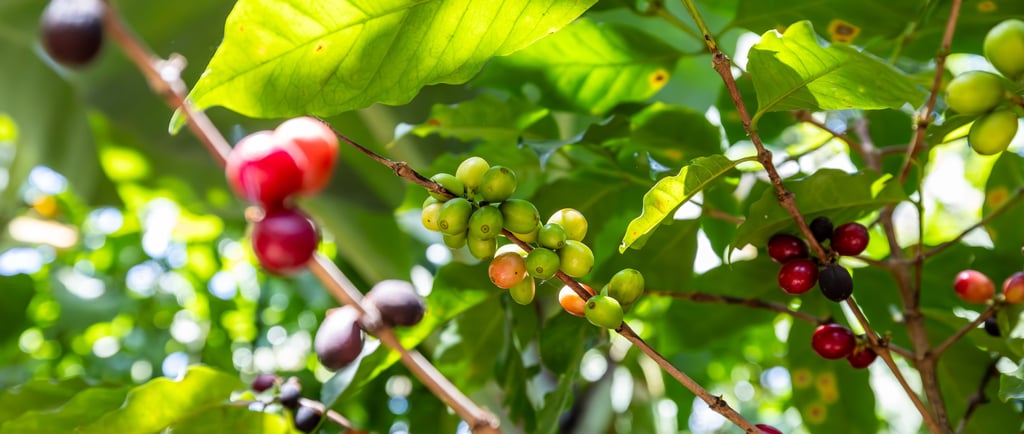What You Don’t Know About Arabica Coffee
Think you know Arabica? This beloved coffee bean is more than just smooth and flavorful. In this post, we dive into the surprising facts most people overlook—from its genetic fragility and climate sensitivity to why “100% Arabica” doesn’t always mean high quality. Whether you’re a casual drinker or a specialty coffee nerd, discover what makes Arabica coffee so complex—and why its future is at risk.


Think you know your morning cup of coffee? If you’re drinking anything above gas station-grade, odds are you’re sipping Arabica. It’s the world’s most popular coffee species, found in everything from high-end single-origin beans to your favorite café’s house blend. But there’s more to Arabica than just smooth flavor and a pretty package.
Here’s what most people don’t know about the most beloved bean in the world.
1. Arabica Wasn’t Always the Favorite
Though Arabica now dominates over 60% of global coffee production, it wasn’t always the bean of choice. In the early days of commercial coffee, Robusta and other varieties were just as prevalent due to their resilience and yield. Arabica’s rise to fame came later—thanks to its superior taste, not its convenience. It's kind of like the wine of the coffee world: more expensive, more complex, and a little more high-maintenance.
2. It’s a Diva to Grow
Arabica may taste refined, but it acts more like a diva in the field.
It requires:
High altitudes (2,000–6,000 ft)
Cool, stable temperatures
Lots of care
And it's extremely vulnerable to pests and disease.
Compare that to the sturdy Robusta plant, and it becomes clear: Arabica’s quality comes at a price—literally. Farmers who grow Arabica often battle climate change, leaf rust, and low yields just to get a single crop.
3. It’s Genetically Weaker Than Robusta
Arabica coffee is a natural hybrid of two older species: Coffea eugenioides and Coffea canephora (aka Robusta). That makes it more complex—but also more vulnerable. Arabica contains 44 chromosomes, double that of Robusta, which contributes to its flavor complexity but weakens its disease resistance.
This is why you'll often hear about scientists and farmers trying to breed more resilient Arabica hybrids—they're trying to protect the bean that keeps the specialty coffee industry alive.
4. Its Flavor Is All About Altitude
Most people know Arabica tastes “better,” but why does it taste better?
It comes down to:
Higher altitude = slower maturation
Slower growth = more complex sugars
Cooler nights = higher acidity
This translates to cups that are floral, fruity, chocolaty, and bright, depending on origin and processing method. Coffee from Ethiopia? Expect bergamot, blueberry, and jasmine. Colombian beans? You might get caramel and red fruit. Arabica expresses terroir like wine grapes do—something Robusta just can’t match.
5. Most "100% Arabica" Claims Mean Very Little
Yep, you read that right. Seeing “100% Arabica” on a coffee bag doesn’t guarantee quality—it only means the beans aren’t Robusta. It’s like saying your orange juice is 100% oranges. That’s the bare minimum.
A “100% Arabica” label could still be:
Low-grade beans
Stale
Poorly roasted
Mass-produced blends with no traceability
If you want a genuinely great cup, look for more specific information like origin, roast date, processing method, and altitude. That’s where the real quality indicators live.
6. Arabica Is in Danger
Arabica is highly sensitive to climate change. As global temperatures rise, the high-altitude zones where it thrives are shrinking. By 2050, some experts estimate that up to 50% of suitable Arabica-growing land could disappear. That’s bad news not just for coffee lovers, but for the millions of farmers who depend on it.
The future of Arabica depends on:
Climate adaptation
Sustainable farming
Support for smallholder growers
Specialty buyers paying ethical premiums
Final Sip
Arabica isn’t just “the good coffee.” It’s a fragile, complex crop with a long history and a challenging future. Every time you choose a well-sourced, fairly traded Arabica coffee, you're not just treating yourself to flavor—you’re supporting the people and ecosystems behind it.
Next time you take a sip, remember: there’s a whole world in that cup.
Related Reads
📖 What You Don’t Know About Robusta Coffee
Discover the bold, misunderstood cousin of Arabica—and why it deserves more respect in your brew.


